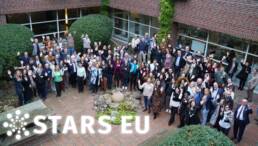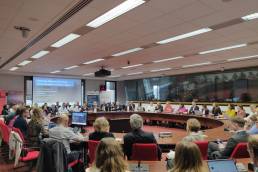Just a year after the European Commission approved the STARS EU alliance’s project to become an European University, 130 people from all nine academic institutions involved in this initiative have joined together at the Hochschule Bremen on 5 and 6 of November, in order to review the advances made so far by the eight work packages, the Thematic Interest Groups (TIG), the Students Board and the Steering Committee.
During the presentation of these two working days, the general coordinator of the alliance, Rima Dijkstra, explained that after this first year of work the project has evolved and will have three priority areas of action: Green Transition, Digital Transformation, and Social value and Welfare. The activities of the alliance’s nine thematic interest groups will be organized around them, namely: Circular Economy; Energy Transition; Living Spaces; Sustainable Industry; Entrepreneurship & Innovation; Digital Transition; Arts & Creative Industries; Inclusion & Social Justice; and Healthy Ageing.
In this first year of work, the foundations have been laid to give impetus to the creation of joint academic titles, with a provisional catalogue of 60 teaching initiatives of different types in the development phase or about to be taught.
Several requirements of the European Commission for the development of the project have also been fulfilled such as the elaboration of the communication plan and the branding of the alliance, the open science strategy for the dissemination of the research developed within STARS EU, the creation of the Technology and Knowledge Transfer Office, and the development of a mobility catalogue among the associated universities, as main milestones in this first year.
During this meeting, all representatives of the work packages and TIG had several joint sessions for making advances in their respective tasks, and there also were individual presentations of the advances made by each group during the last twelve months.
STARS EU organizes two large-scale gatherings every year in addition to those that the alliance entities may need separately: the General Conference in Spring, which this year was hosted in March by the University of Franche-Comté at Besançon (France) and in 2025 it will be hosted by the Aleksandër University of Durrës (Albania) on March 19, 20 and 21; and another follow-up meeting of the EC project, which is the one that has been held in Germany and in 2025 will be hosted by the University of La Laguna.
Related Posts
18 de noviembre de 2024
STARS EU STUDENTS COMPLETE AN ERASMUS+ BIP CIRCULAR ECONOMY COURSE AT THE UNIVERSITY OF LA LAGUNA
This intensive training experience has been completed with a programme of…
22 de octubre de 2024
STARS EU knowledge transfer office kicks off
The new service provides 72 technological services that supply advanced…
15 de octubre de 2024
Workshop at #EURegionsWeek Explores Regional Talent and Skills Development
The activity consisted of sharing regional talents and skills.




